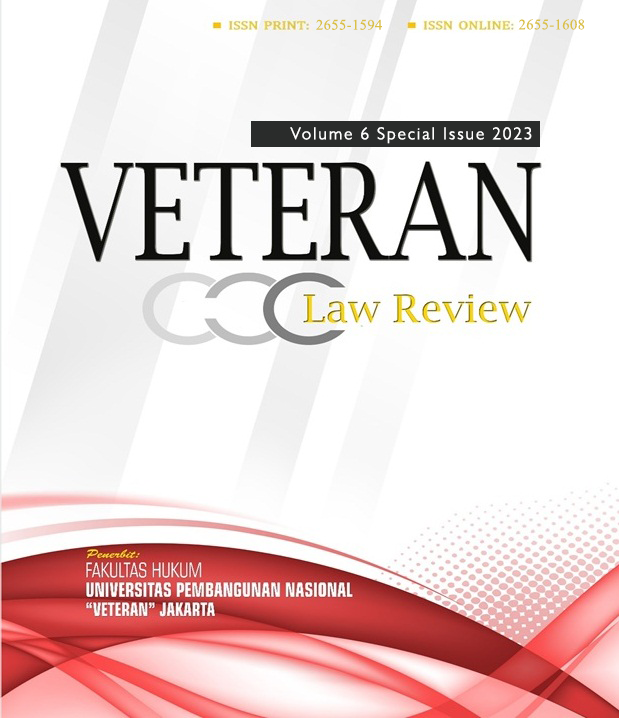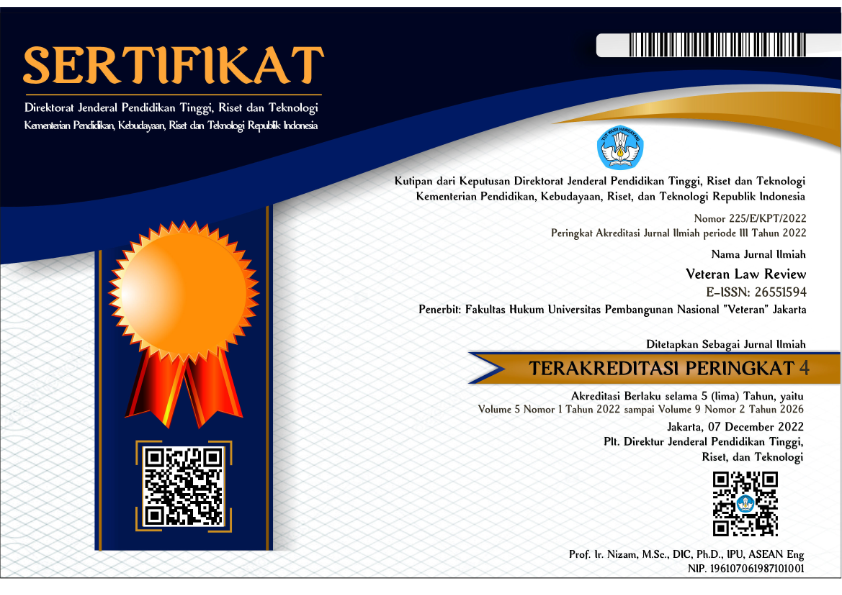Patriarchal Culture, Sexual Violence, and Legal Protection for Women in Indonesia
DOI:
https://doi.org/10.35586/velrev.v6iSpecialIssues.5758Keywords:
Patriarchal Culture, Sexual Violence, Feminist Legal Theory and Protection for Women in IndonesiaAbstract
Patriarchal culture cannot be separated from women's lives. Male domination over women has become a daily reality in many countries. Patriarchal culture assumes that women are "objects" and men are humans. In this case, men become subjects, and women as objects are regulated by men in various lines of life and culture. The impact of patriarchal culture is to place women who experience sexual violence in a worse position. At the level of the construction of a large Indonesian society that still uses a patriarchal paradigm, women are placed as second-class citizens. As a result, often the statements and reports from women are not heard. A further implication for women victims of sexual violence is that they are re-victimized by society, considered as the party that caused the violence. This article will raise two legal issues related to legal theory and law. The first legal issue in this paper is related to feminist legal theory based on the feminist view that in history, law is to perpetuate the position of women under the subordination of men. After discussing feminist legal theory, the author will discuss the second issue, namely law related to law enforcement in the field of sexual violence and its relation to feminist legal theory. Feminist legal theory is needed in building the basis of statutory norms (legal dogmatics) and the justice system to eliminate all forms of violence, especially sexual violence.
Downloads
References
Admodjo, Boedi Djatmiko Hadi. (2021). Penelitian Hukum: Isu Hukum. Bahan Ajar Program Studi Doktor Ilmu Hukum Fakultas Hukum Usakti, Perkuliahan Semester Gasal Tahun Akademik 2021/2022.
Ahsana Nadiya, Penegakan Hukum Kekerasan Seksual Terhadap Perempuan di Indonesia: Sudahkah Berperspektif Korban?. Retrived April 16 2023, 13.00 WIB. https://kawanhukum.id/penegakan-hukum-tindak-kekerasan-seksual-terhadapperempuan-di-indonesia-sudahkah-berperspektif-korban/2.
Anisah, Laili Nur. (2018). Tindak Pidana Perzinaan RUU KUHP: Perlindungan Hukum Versus Kriminalisasi Perempuan. Jurnal Perempuan, 23(2).
Bressler, Charless E. (2007). Literary Criticism : An Introduction to Theory and Practice. Fifth Edition. US : Pearson Education.
Bripda Randy Tersangka Kasus Novia Widyasari Dijebloskan ke Tahanan. Retrived April 16 2023, 07.00 WIB. https://www.cnnindonesia.com/nasional/20211205194015-12-730191/bripdarandy-tersangka-kasus-novia-widyasari-dijebloskan-ke-tahanan.
Budiarjo, Miriam. (1991). Aneka Pemikiran Tentang Kuasa dan Wibawa. Jakarta: Sinar Harapan.
California Passes First-Ever Bill to Define Sexual Consent on College Campusses. Retrived April 14 2023, 10.00 WIB. http://time.com/3211938/campus-sexual-assault-consent-california.
Dirkareshza, R., Dirkareshza, N. P., Taupiqqurrahman, T., Agustanti, R. D., & Ramadhita, M. P. (2022). URGENSI PARTISIPASI MASYARAKAT DALAM PROSES PEMBENTUKAN PERATURAN PEMBERLAKUAN PEMBATASAN KEGIATAN MASYARAKAT MENUJU INDONESIA TANGGUH DAN INDONESIA MAJU. Gorontalo Law Review, 5(2), 391-398.
Dirkareshza, R., Sihombing, E. N., & Agustanti, R. D. (2022). The Problem of Criminalization of Commercial Sexual Workers and Users of Prostitution Services. Jurnal Penelitian Hukum De Jure, 22(4), 525-536.
Dalam Rumah Tangga dan Kekerasan Seksual, Panduan dalam Bentuk Tanya-Jawab. Jakarta: Program Studi Kajian Wanita Program Pascasarjana Universitas Indonesia.
Fakih, Mansour. (1996). Analisis Gender dan Transformasi Sosial. Yogyakarta: Pustaka Pelajar.
Gosita, Arif. (1987). Relevansi Viktimologi Dengan Pelayanan Terhadap Para Korban Perkosaan. Jakarta: INDHILL CO.
Guru Pesantren Perkosa Belasan Santri, Respons Pelaku Herry Wirawan Mengejutkan. Retrived April 16 2023, 07.00 WIB. https://nasional.okezone.com/read/2021/12/09/337/2514492/guru-pesantrenperkosa-belasan-santri-respons-pelaku-herry-wirawan-mengejutkan.
Katjasungkana, Nursyahbani. Metode Analisa Kasus Berperspektif Gender.
Katjasungkana, Nursyhabani. (1994). Perkembangan Hukum Positif Yang Mengatur Kejahatan Seksual. Makalah pada Pertemuan Ilmiah tentang Penanggulangan.
Kekerasan Seksual di Kampus. Retrived April 15 2023, 17.07 WIB. https://www.dw.com/id/kekerasan-seksual-dikampus/a-59838953.
Mukminto, Eko, BPHN. (2020). Kejahatan Yang Dilakukan Oleh Anak Usia Muda, Hukum, Ideologi Patriarki, Dan Kekerasan Sistematik Atas Perempuan: Suatu Kajian. Nurani Hukum : Jurnal Ilmu Hukum, 3(1).
Naskah Akademik Rancangan Undang-Undang Tentang Penghapusan Kekerasan Seksual (2015).
Perlindungan Hukum Korban Kekerasan dan Pelecehan Seksual Minim,. Retrived Desember 9 2021, 12.00 WIB. https://www.uii.ac.id/perlindungan-hukum-korban-kekerasan-dan-pelecehanseksual-minim/.
Poerwandari, Kristi. (2008). Penguatan psikologis untuk menanggulangi Kekerasan.
Sakina, Ade Irma dan Dessy Hasanah Siti A. (2017). Menyoroti Budaya Patriarki di Indonesia. Social Work Jurnal, 7(1).
Savitri, Niken. (2008). HAM Perempuan, Kritik Teori Hukum Feminis Terhadap KUHP. PT. Bandung: Refika Aditama.
Downloads
Published
How to Cite
Issue
Section
License
Copyright (c) 2023 Veteran Law Review

This work is licensed under a Creative Commons Attribution-ShareAlike 4.0 International License.
Copyright (c) 2022 Veteran Law Review Journal
Veteran Law Review © 2022 by Faculty of Law Universitas Pembangunan Nasional "Veteran" Jakarta is licensed under Creative Commons Attribution 4.0 International

1. License
The non-commercial use of the article will be governed by the Creative Commons Attribution license as currently displayed on Creative Commons Attribution 4.0 International.
2. Author(s)' Warranties
The author warrants that the article is original, written by the stated author(s), has not been published before, contains no unlawful statements, does not infringe the rights of others, is subject to copyright that is vested exclusively in the author, and free of any third party rights, and that any necessary written permissions to quote from other sources have been obtained by the author(s).
3. User/Public Rights
VELREV's spirit is to disseminate articles published are as free as possible. Under the Creative Commons Attribution-ShareAlike 4.0 International License. VELREV permits users to copy, distribute, display, and perform the work for non-commercial purposes only. Users will also need to attribute authors and VELREV to distributing works in the journal and other media of publications.
4. Rights of Authors
Authors retain all their rights to the published works, such as (but not limited to) the following rights;
- Reproduce the work
- Prepare derivative works based upon the work
- Distribute copies of the work
- Perform the work publicly
- Display the work publicly
- Copyright and other proprietary rights relating to the article, such as patent rights,
- The right to self-archive the article,
- The right to enter into separate, additional contractual arrangements for the non-exclusive distribution of the article's published version (e.g., post it to an institutional repository or publish it in a book), with an acknowledgement of its initial publication in this journal (Veteran Law Review).
5. Co-Authorship
If the article was jointly prepared by more than one author, any author submitting the manuscript warrants that he/she has been authorized by all co-authors to be agreed on this copyright and license notice (agreement) on their behalf, and agrees to inform his/her co-authors of the terms of this policy. VELREV will not be held liable for anything that may arise due to the author's internal dispute. VELREV will only communicate with the corresponding author.
6. Royalties
Being an open accessed journal and disseminating articles for free under the Creative Commons license term mentioned, author(s) are aware that VELREV entitles the author(s) to no royalties or other fees.
7. Miscellaneous
VELREV will publish the article (or have it published) in the journal if the article’s editorial process is successfully completed. JOSI's editors may modify the article to a style of punctuation, spelling, capitalization, referencing, and usage that deems appropriate. The author acknowledges that the article may be published so that it will be publicly accessible and such access will be free of charge for the readers as mentioned in point 3.


















